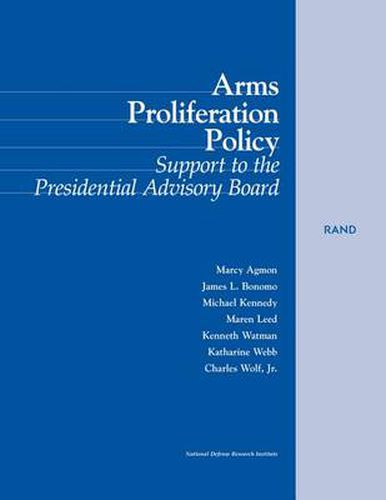Readings Newsletter
Become a Readings Member to make your shopping experience even easier.
Sign in or sign up for free!
You’re not far away from qualifying for FREE standard shipping within Australia
You’ve qualified for FREE standard shipping within Australia
The cart is loading…






A 1995 Presidential Executive Order established a board to advise the president on implementing a policy on conventional (nonnuclear) arms and technology transfer. The board was to study the factors that contribute to the proliferation of strategic and advanced conventional military weapons and technology and the policy options the United States might use to inhibit such proliferation. Shrinking federal budgets have made exports of all kinds, including weapons, an attractive means of shoring up a country’s industrial base. The heart of the problem is striking a balance between the preservation of military production and a healthy industrial base on the one hand, and restraining exports that proliferate advanced weapons. Foreign policy, national security, and economic interests that are served by the approval or denial of weapons sales can be compelling, but often pull in different directions. Striking the right balance among cross-cutting priorities is the key to an effective weapons transfer policy. This report discusses trends in the international arms markets, how transfers of weapons and technology are controlled, the economics of arms exports, and the relationship between arms exports and a country’s economy.
$9.00 standard shipping within Australia
FREE standard shipping within Australia for orders over $100.00
Express & International shipping calculated at checkout
A 1995 Presidential Executive Order established a board to advise the president on implementing a policy on conventional (nonnuclear) arms and technology transfer. The board was to study the factors that contribute to the proliferation of strategic and advanced conventional military weapons and technology and the policy options the United States might use to inhibit such proliferation. Shrinking federal budgets have made exports of all kinds, including weapons, an attractive means of shoring up a country’s industrial base. The heart of the problem is striking a balance between the preservation of military production and a healthy industrial base on the one hand, and restraining exports that proliferate advanced weapons. Foreign policy, national security, and economic interests that are served by the approval or denial of weapons sales can be compelling, but often pull in different directions. Striking the right balance among cross-cutting priorities is the key to an effective weapons transfer policy. This report discusses trends in the international arms markets, how transfers of weapons and technology are controlled, the economics of arms exports, and the relationship between arms exports and a country’s economy.